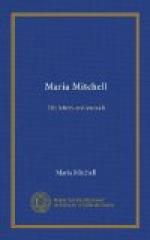It must be regarded as a striking proof of an enlightened interest for the promotion of science, not less than of a kind regard for the rights and feelings of the individual most concerned in this decision, that the king of Denmark should have bestowed his attention upon this subject, at a period of so much difficulty and alarm for Europe in general and his own kingdom in particular. It would not have been possible to act more promptly in a season of the profoundest tranquillity. His Majesty has on this occasion shown that he is animated by the same generous zeal for the encouragement of astronomical research which led his predecessor to found the medal; while he has performed an act of gracious courtesy toward a stranger in a distant land which must ever be warmly appreciated by her friends and countrymen.
Nor ought the obliging agency of the Count de Knuth, the Minister of Foreign Affairs, to be passed without notice. The slightest indifference on his part, even the usual delays of office, would have prevented the application from reaching the king before the expiration of the twelvemonth within which all claims must, by the regulations, be presented. No one can reflect upon the pressure of business which must have existed in the foreign office at Copenhagen during the past year, without feeling that the Count de Knuth must largely share his sovereign’s zeal for science, as well as his love of justice. Nothing else will account for the attention bestowed at such a political crisis on an affair of this kind. The same attention appears to have been given to the subject by his successor, Count Moltka.
It was quite fortunate for the success of the application that the office of charge d’affaires of the United States at Copenhagen happened to be filled by a gentleman disposed to give it his prompt and persevering support. A matter of this kind, of course, lay without the province of his official duties. But no subject officially committed to him by the instructions of his government could have been more zealously pursued. On the very day on which my communication of the 8th of August reached him, Mr. Fleniken addressed his letters to the minister of foreign affairs and to the king, and he continued to give his attention to the subject till the object was happily effected, and the medal placed in his hands.
The event itself, however insignificant in the great world of politics and business, is one of pleasing interest to the friends of American science, and it has been thought proper that the following record of it should be preserved in a permanent form. I have regretted the frequent recurrence of my own name in the correspondence, and have suppressed several letters of my own which could be spared, without rendering less intelligible the communications of the other parties, to whom the interest and merit of the transaction belong.
EDWARD EVERETT.
CAMBRIDGE, 1st February, 1849.




